Preventing and Treating Parasites in Birds
- Saifur Rahman
- Aug 6, 2024
- 13 min read
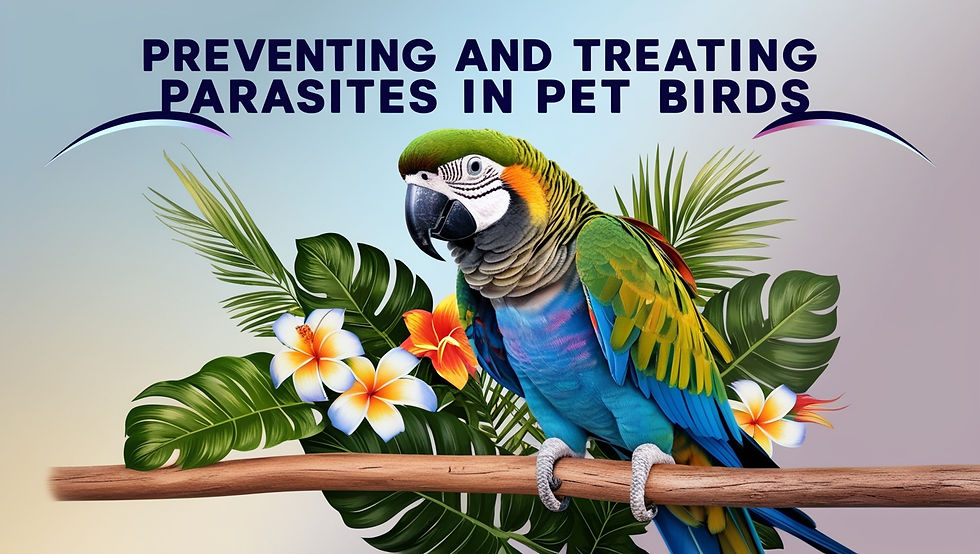
Key Takeaways
Key Points | Descriptions | Implications |
Types of Bird Parasites | Overview of internal, external, protozoan, and other parasites affecting birds. | Understanding parasite types helps in identifying and treating infestations more effectively. |
Identifying Parasite Infestations | Recognizing symptoms, physical signs, and behavioral changes in birds. | Early detection can lead to timely treatment and reduce health complications for birds. |
Preventive Measures | Health check-ups, clean environments, and quarantine procedures. | Implementing preventive measures reduces the risk of parasite infestations and promotes bird health. |
Natural Treatments | Use of herbal remedies, homeopathic treatments, and natural supplements. | Natural treatments can be an alternative to chemical medications, offering a holistic approach to parasite control. |
Medications and Chemical Treatments | Antiparasitic drugs, dewormers, insecticides, and antibiotics. | Chemical treatments are effective but should be used judiciously to avoid resistance and side effects. |
Impact of Parasites on Bird Health | Effects on weight, feathers, egg production, and overall health. | Understanding the impact helps in prioritizing treatments and preventive measures. |
Managing Parasite Outbreaks | Isolation protocols, emergency treatments, and environmental decontamination. | Effective outbreak management minimizes the spread and impact of parasites. |
Seasonal Considerations | Seasonal prevalence, preventive measures, and climate impact on parasites. | Adjusting care routines based on seasons ensures better parasite control. |
Parasites in Different Bird Species | Specific parasites affecting parrots, finches, canaries, pigeons, chickens, and wild birds. | Species-specific information allows for tailored preventive and treatment strategies. |
Impact on Breeding Birds | Infertility issues, egg mortality, and nest sanitation practices. | Special considerations for breeding birds ensure healthy reproduction and offspring. |
Role of Environment in Parasite Control | Habitat modification, safe nesting materials, and controlling wild bird exposure. | Creating a parasite-free environment reduces infestation risks. |
Research and Advances in Parasite Control | Latest research findings, treatment advancements, and new preventive measures. | Staying updated with research helps in adopting the best practices for parasite control. |
Introduction
Did you know that 80% of birds can suffer from parasites at some point in their lives? Keeping our feathered friends healthy is important. Understanding how to prevent and treat parasites in birds helps them live a happy life.
Parasites can make birds sick. They can hide inside or on the outside of birds. But don't worry, with the right knowledge and care, we can keep birds safe.
This guide will help you learn all about preventing and treating parasites in birds. We will cover many topics, including:
Types of bird parasites
How to identify infestations
Preventive measures
Natural and chemical treatments
By the end, you will know how to keep your birds healthy and free from parasites. Let's get started and keep our birds happy!
1. Types of Bird Parasites
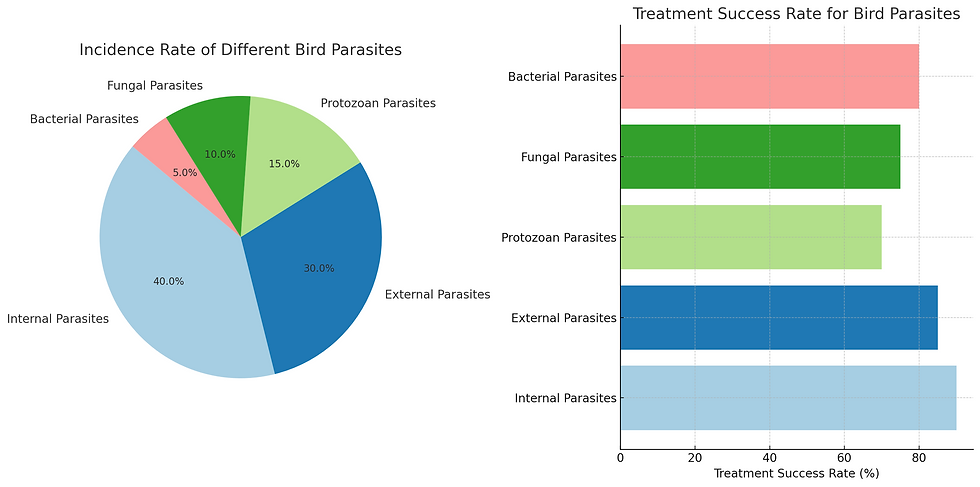
Birds can suffer from many types of parasites. Understanding these parasites helps in keeping your feathered friends healthy and happy.
What are the common symptoms of internal parasites in birds?
Internal parasites live inside the bird's body. They can cause problems like:
Weight loss
Lethargy
Gastrointestinal issues
Learn more about keeping your bird's environment clean to prevent these issues in our article on Cleaning the Cage.
How do external parasites affect bird behavior?
External parasites live on the bird's body. They can make your bird:
Feather plucking
Restless
Less active
Discover tips on handling birds and building trust in our guide on Handling and Bonding.
What treatments are available for protozoan parasites?
Protozoan parasites can be treated with special medicines. These include:
Antiprotozoal medications
Dietary supplements
For more information on dietary needs, check out our post on the Importance of a Balanced Diet for Birds.
What preventive measures can be taken against worm infestations?
To prevent worm infestations in birds, you can:
Regular deworming
Keeping their environment clean
Quarantining new birds
Learn more about setting up a safe space for your bird with our Cage Size Guidelines.
How can bird owners identify mite infestations?
Mite infestations can be identified by looking for signs like:
Feather loss
Skin irritation
Learn more about feather care and preventing mite infestations in our article on Feather Care.
What are the risks associated with lice in birds?
Lice infestations can cause:
Feather damage
Skin irritation
Anemia
Find out more about common bird diseases and how to prevent them in our post on Common Bird Diseases.
2. Identifying Parasite Infestations
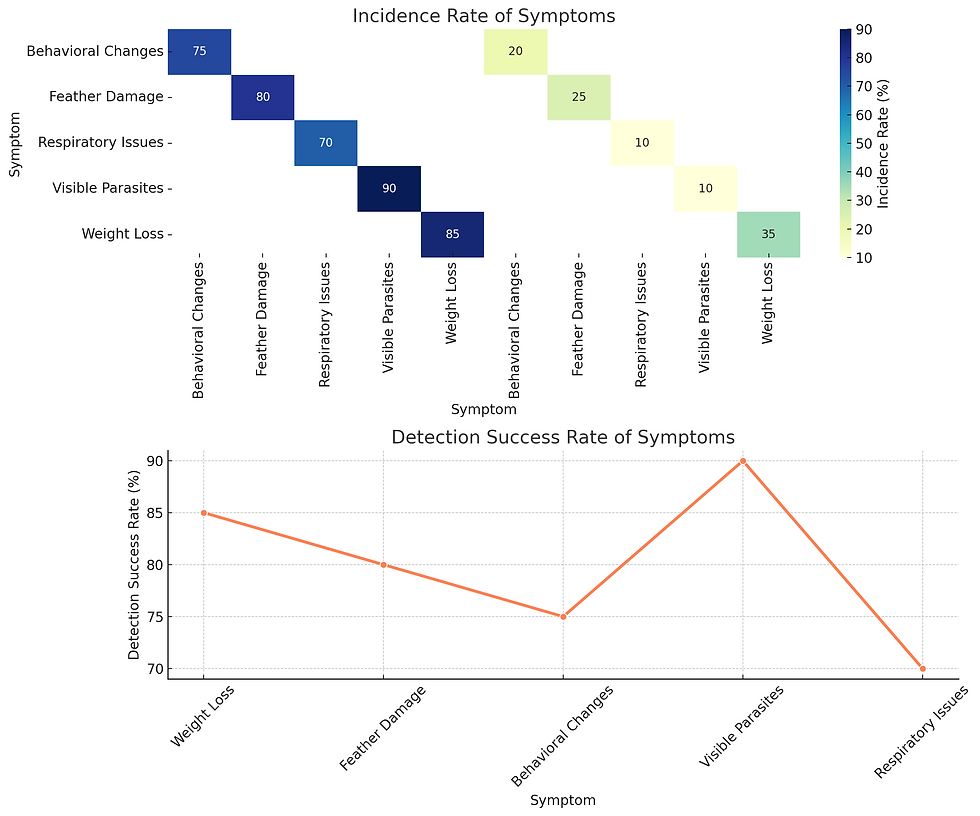
Knowing how to spot parasite infestations early can help keep your bird healthy. Here are some tips to identify them.
How can bird owners recognize physical signs of parasites?
Look for physical signs of parasites, such as:
Visible parasites on the bird's body
Feather damage
Skin lesions
For tips on daily bird care, read our article on Daily Care Routine.
What behavioral changes indicate a parasite problem?
Behavioral changes to watch for include:
Increased grooming
Feather plucking
Decreased activity
Find out more about common bird behaviors and their meanings in our post on Common Behaviors.
What diagnostic tests are commonly used for detecting parasites?
Common diagnostic tests for parasites include:
Fecal examinations
Blood tests
Microscopic analysis
For more information on how to care for your bird, check out our guide on Handling and Bonding.
How effective are laboratory tests in identifying parasite types?
Laboratory tests are very effective for identifying parasite types. They help in:
Accurate identification
Early detection
Targeted treatment
Discover more about common bird diseases and how to identify them early in our post on Common Bird Diseases.
What are the best practices for visual inspection of birds?
The best practices for visual inspection include:
Regular checks
Thorough examination
Using magnification
Learn how to keep your bird's environment clean and safe in our article on Cleaning the Cage.
How can early detection of parasites be achieved?
Early detection of parasites can be achieved through:
Routine health monitoring
Awareness of symptoms
Regular vet visits
Check out our tips on keeping your bird healthy with regular check-ups in our post on Daily Care Routine.
3. Preventive Measures

Taking preventive measures can keep your birds healthy and free from parasites. Here are some easy steps to follow.
What routine health check-ups are recommended for birds?
Regular health check-ups are important for your birds. This includes:
Annual vet visits
Periodic fecal exams
Overall health assessments
Learn more about daily bird care routines in our article on Daily Care Routine.
How can living environments be kept clean to prevent parasites?
Keeping the living environment clean is crucial. You can do this by:
Regular cleaning
Disinfecting cages
Avoiding overcrowding
For tips on setting up a proper cage, check our guide on Choosing a Cage.
What are the best quarantine procedures for new birds?
Quarantine procedures help prevent the spread of parasites. These steps include:
Isolation period
Health monitoring
Gradual introduction
Learn more about introducing new birds in our article on Introducing New Birds.
What hygiene practices help reduce parasite risks?
Good hygiene practices keep parasites away. Follow these tips:
Regular bathing
Cleaning feeding areas
Proper waste disposal
For more hygiene tips, read our post on Cleaning the Cage.
How effective are preventive medications against parasites?
Preventive medications can be very effective. They help by:
Reducing infestation risk
Providing long-term protection
Having minimal side effects
Find out more about bird diseases and preventive care in our article on Common Bird Diseases.
How does nutrition support immunity against parasites?
Good nutrition boosts your bird's immunity. Ensure your bird gets:
Balanced diet
Vitamins
Minerals
Learn about the importance of a balanced diet in our post on Importance of a Balanced Diet for Birds.
4. Natural Treatments
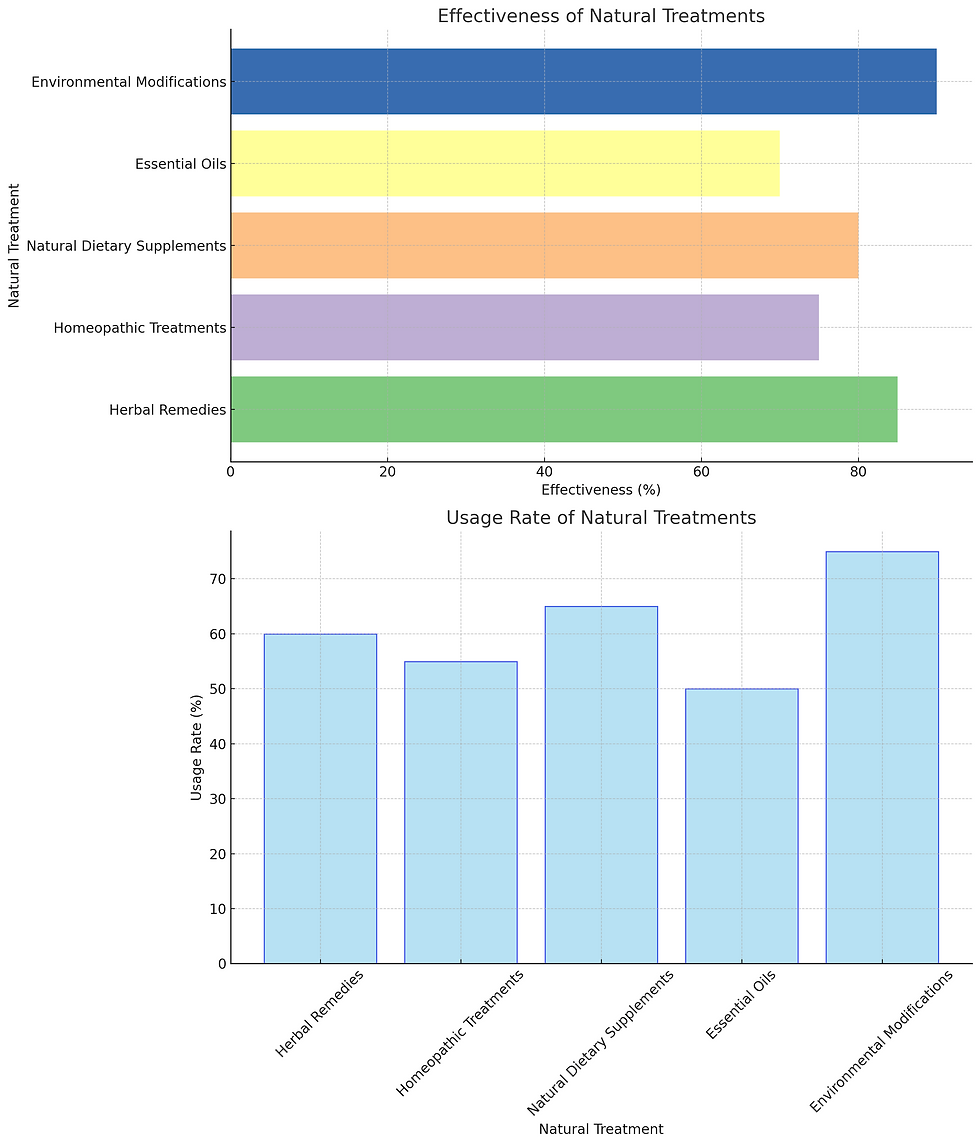
Using natural treatments can help keep your birds free from parasites. Here are some natural ways to treat your birds.
What herbal remedies are effective against bird parasites?
Herbal remedies are a great natural option. Some effective herbs include:
Garlic
Neem
Wormwood
Find out more about using herbs and other natural treatments in our post on Fresh Foods.
How can homeopathic treatments be used for parasite control?
Homeopathic treatments offer a gentle way to control parasites. Common treatments include:
Arsenicum album
Sulphur
Psorinum
Learn more about homeopathic care in our article on Common Bird Diseases.
What natural dietary supplements support parasite resistance?
Natural dietary supplements can help your bird resist parasites. These include:
Probiotics
Prebiotics
Herbal supplements
Check out our tips on balanced diets and supplements in our post on Pellet Diets.
Are essential oils safe and effective for parasite treatment?
Essential oils can be used for treating parasites. Safe oils include:
Tea tree oil
Lavender oil
Eucalyptus oil
Learn more about using essential oils safely in our guide on Feather Care.
How do probiotics help in preventing parasites?
Probiotics boost gut health and help prevent parasites. Benefits include:
Enhanced digestion
Improved immunity
Balanced gut flora
For more on the benefits of probiotics, read our article on Importance of a Balanced Diet for Birds.
What environmental modifications support natural parasite control?
Making environmental modifications helps control parasites. Consider:
Habitat changes
Natural deterrents
Supportive environment
Discover ways to enhance your bird's habitat in our post on Cage Size Guidelines.
5. Medications and Chemical Treatments

Using medications and chemical treatments can effectively control parasites in birds. Here are some methods.
What are the most common antiparasitic drugs for birds?
Antiparasitic drugs are important for treating parasites. Common drugs include:
Ivermectin
Fenbendazole
Metronidazole
Learn more about treating bird diseases in our article on Common Bird Diseases.
How often should dewormers be administered to birds?
Dewormers help keep birds free from worms. They should be given:
Monthly
Quarterly
Annually
For tips on maintaining bird health, read our post on Daily Care Routine.
What insecticides are safe for use around birds?
Insecticides can protect birds from insects. Safe options include:
Pyrethrin-based
Permethrin
Natural insecticides
Learn more about keeping your bird's environment clean in our guide on Cleaning the Cage.
When are antibiotics necessary for treating parasite-related infections?
Antibiotics are used to treat infections caused by parasites. They are needed when:
Broad-spectrum antibiotics are required
Targeted antibiotics are prescribed
Antibiotic resistance is a concern
Discover more about bird health in our article on Common Bird Diseases.
How do vaccinations help in preventing parasitic infections?
Vaccinations can prevent parasitic infections. Available vaccines include:
Coccidiosis vaccines
Newcastle disease vaccines
Fowl pox vaccines
Find out more about keeping birds healthy with preventive measures in our post on Balanced Diet for Birds.
What are the best topical treatments for external parasites?
Topical treatments are used for external parasites. Effective treatments include:
Spot-on treatments
Sprays
Dusting powders
Learn more about taking care of your bird's feathers in our article on Feather Care.
6. Impact of Parasites on Bird Health

Parasites can have a big impact on your bird's health. Knowing these effects helps in better care.
How do parasites cause weight loss in birds?
Parasites can lead to weight loss in birds by:
Nutrient depletion
Metabolic effects
Anorexia
Learn more about keeping your bird healthy in our article on Daily Care Routine.
What feather damage is indicative of parasite infestation?
Feather damage can be a sign of parasite infestation. Look for:
Feather plucking
Feather loss
Poor feather quality
For more on feather care, check out our post on Feather Care.
How do parasites affect egg production in birds?
Parasites can reduce egg production by causing:
Reduced laying
Poor egg quality
Infertility
Learn more about breeding birds in our post on Breeding Basics.
What respiratory issues are linked to parasitic infections?
Parasitic infections can cause respiratory issues like:
Air sac mites
Lungworms
Tracheal mites
Find out more about common bird diseases in our post on Common Bird Diseases.
How do parasites cause gastrointestinal problems in birds?
Gastrointestinal problems from parasites include:
Diarrhea
Bloating
Weight loss
Learn more about bird nutrition and health in our article on Balanced Diet for Birds.
What secondary infections can arise from parasite infestations?
Parasite infestations can lead to secondary infections such as:
Bacterial infections
Fungal infections
Viral infections
Find out more about how to protect your bird from diseases in our article on Common Bird Diseases.
7. Managing Parasite Outbreaks
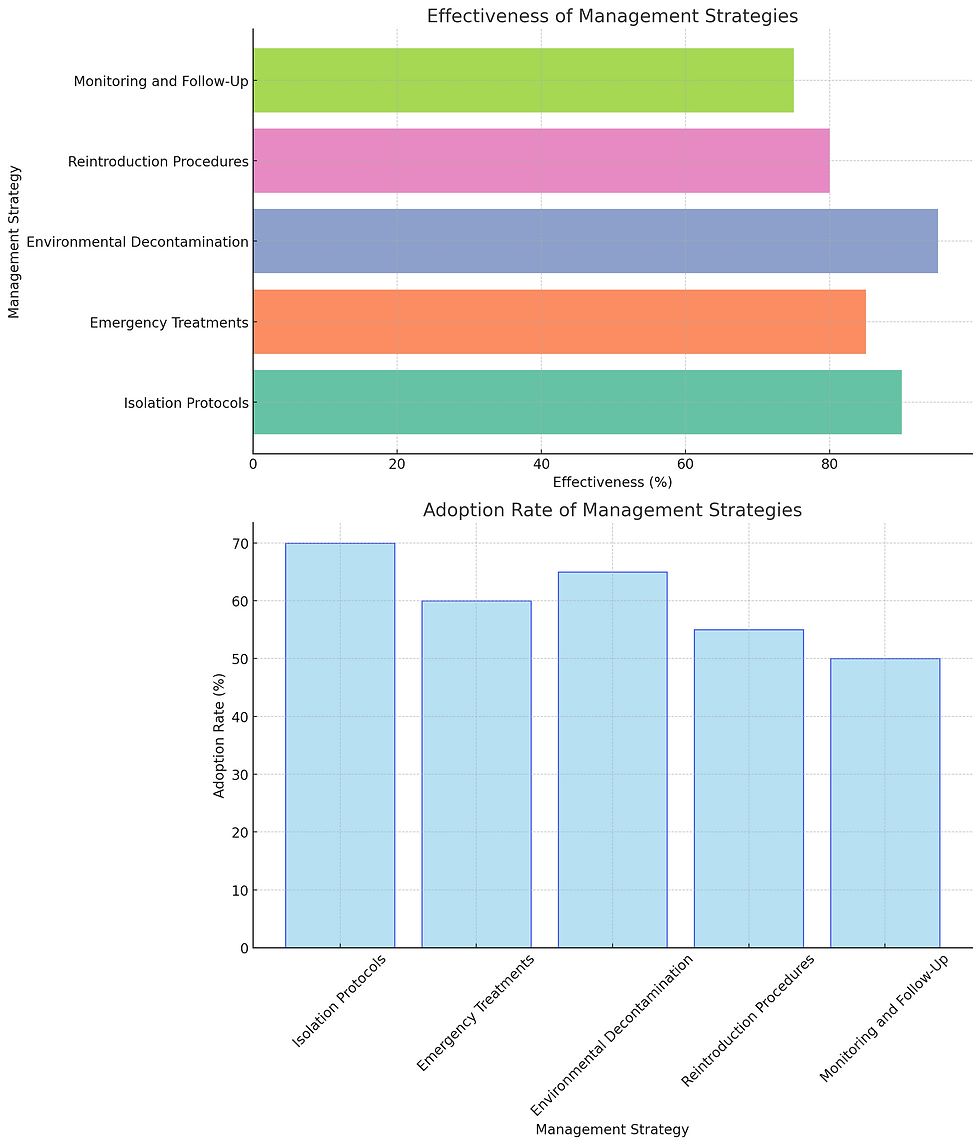
Managing parasite outbreaks is important to keep your birds healthy. Here are some steps to follow.
What isolation protocols should be followed during an outbreak?
Isolation protocols help control parasite outbreaks. Follow these steps:
Immediate isolation of affected birds
Separate cages to prevent spread
Health monitoring of all birds
For more on bird care, read our article on Daily Care Routine.
What are the emergency treatments for severe parasite infestations?
In case of severe infestations, use these emergency treatments:
Immediate antiparasitic medications
Supportive fluids for hydration
Critical care under a vet’s supervision
Learn more about common bird diseases and treatments in our post on Common Bird Diseases.
How should the environment be decontaminated after an outbreak?
Decontaminate the environment to prevent re-infestation. Steps include:
Thorough cleaning of cages and equipment
Using disinfectants to kill parasites
Replacing bedding and nesting materials
For tips on maintaining a clean cage, check our guide on Cleaning the Cage.
What procedures should be followed for reintroducing treated birds?
Reintroduce treated birds carefully. Follow these procedures:
Gradual integration back into the flock
Health checks to ensure they are parasite-free
Monitoring for any signs of relapse
Learn more about handling birds in our post on Handling and Bonding.
How can bird owners monitor and follow up after treatment?
Monitoring and follow-up ensure birds stay healthy. This includes:
Regular health checks
Watching for symptoms
Keeping health records
Find out more about maintaining bird health in our article on Daily Care Routine.
Why is record keeping important in managing parasite outbreaks?
Record keeping is key in managing parasite outbreaks. It helps in:
Tracking treatments and responses
Identifying patterns in outbreaks
Planning future prevention strategies
Learn more about daily care and monitoring in our post on Daily Care Routine.
8. Seasonal Considerations
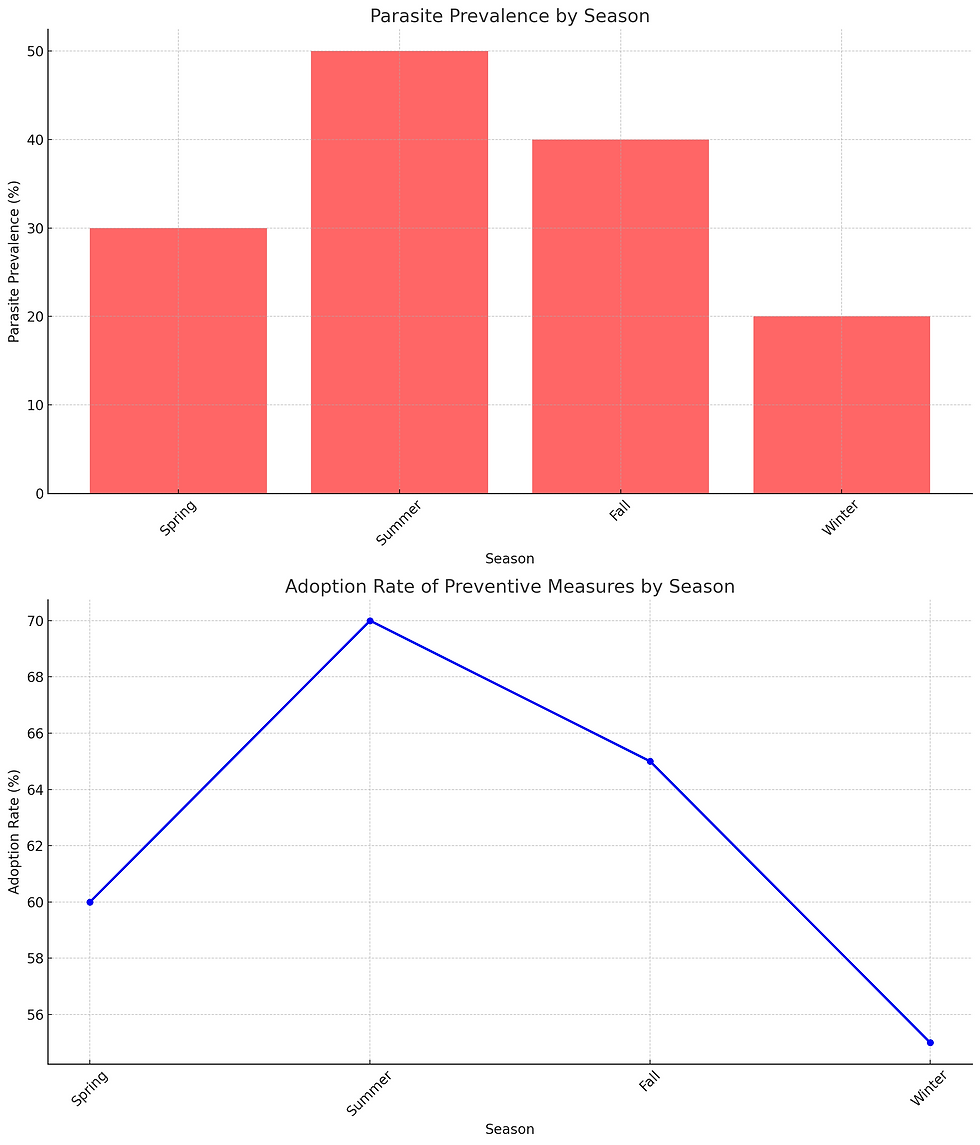
Parasites can be more active in certain seasons. Here’s how to manage them.
What parasites are more prevalent during specific seasons?
Some parasites are more common in certain seasons. These include:
Summer: Fleas and ticks
Winter: Mites
Rainy season: Worms
Find out more about bird health in different seasons in our post on Common Bird Diseases.
What seasonal preventive measures are most effective?
Use seasonal preventive measures to protect birds. These include:
Seasonal deworming
Climate-specific practices
Seasonal hygiene routines
Learn more about keeping birds healthy year-round in our article on Daily Care Routine.
How does climate affect the life cycles of bird parasites?
Climate impacts parasite life cycles. Warm climates can:
Increase breeding of parasites
Shorten life cycles
Spread parasites faster
For tips on creating a healthy environment, check our guide on Choosing a Cage.
How should care routines be adjusted seasonally for parasite control?
Adjust care routines to control parasites seasonally. Tips include:
Increased cleaning in summer
Extra bedding in winter
Regular health checks in rainy seasons
Learn more about daily bird care in our post on Daily Care Routine.
What are the recommended treatment schedules for different seasons?
Follow these treatment schedules for different seasons:
Summer: Monthly deworming
Winter: Quarterly mite checks
Rainy season: Bi-monthly health checks
Find out more about keeping your bird healthy with regular check-ups in our post on Daily Care Routine.
How do migratory patterns influence parasite exposure?
Migratory patterns can increase parasite exposure. Consider:
Migration timing: Higher risk during peak seasons
Route-specific risks: Certain areas have more parasites
Migratory bird health: Monitor closely during migration
Learn more about how to protect your birds during travel in our post on Traveling with Pet Birds.
9. Parasites in Different Bird Species

Different bird species can be affected by different parasites. Understanding these helps in better care.
What parasites commonly affect parrots?
Parrots can suffer from various parasites. Common ones include:
Mites
Lice
Internal parasites
Learn more about parrot care in our article on Macaws.
How can finch owners prevent and treat parasite infestations?
Finch owners can prevent and treat parasite infestations by:
Regular health checks
Clean environments
Proper nutrition
Find out more about finch care in our post on Seed Mixes.
What are the signs of parasite problems in canaries?
Canaries can show signs of parasites like:
Feather loss
Weight loss
Lethargy
Learn more about canary care in our article on Canaries.
How do pigeons typically get infested with parasites?
Pigeons can get parasites from:
Dirty environments
Contact with wild birds
Poor hygiene
Discover more about pigeon care in our post on Breeding Pairs.
What preventive measures are recommended for chickens?
Chickens need preventive measures to avoid parasites. These include:
Regular deworming
Clean coops
Healthy diet
For more on chicken care, check our guide on Fresh Foods.
How can wild bird parasites impact pet birds?
Wild bird parasites can affect pet birds by:
Spreading diseases
Contaminating habitats
Causing infestations
Learn more about preventing parasite spread in our article on Cleaning the Cage.
10. Impact on Breeding Birds
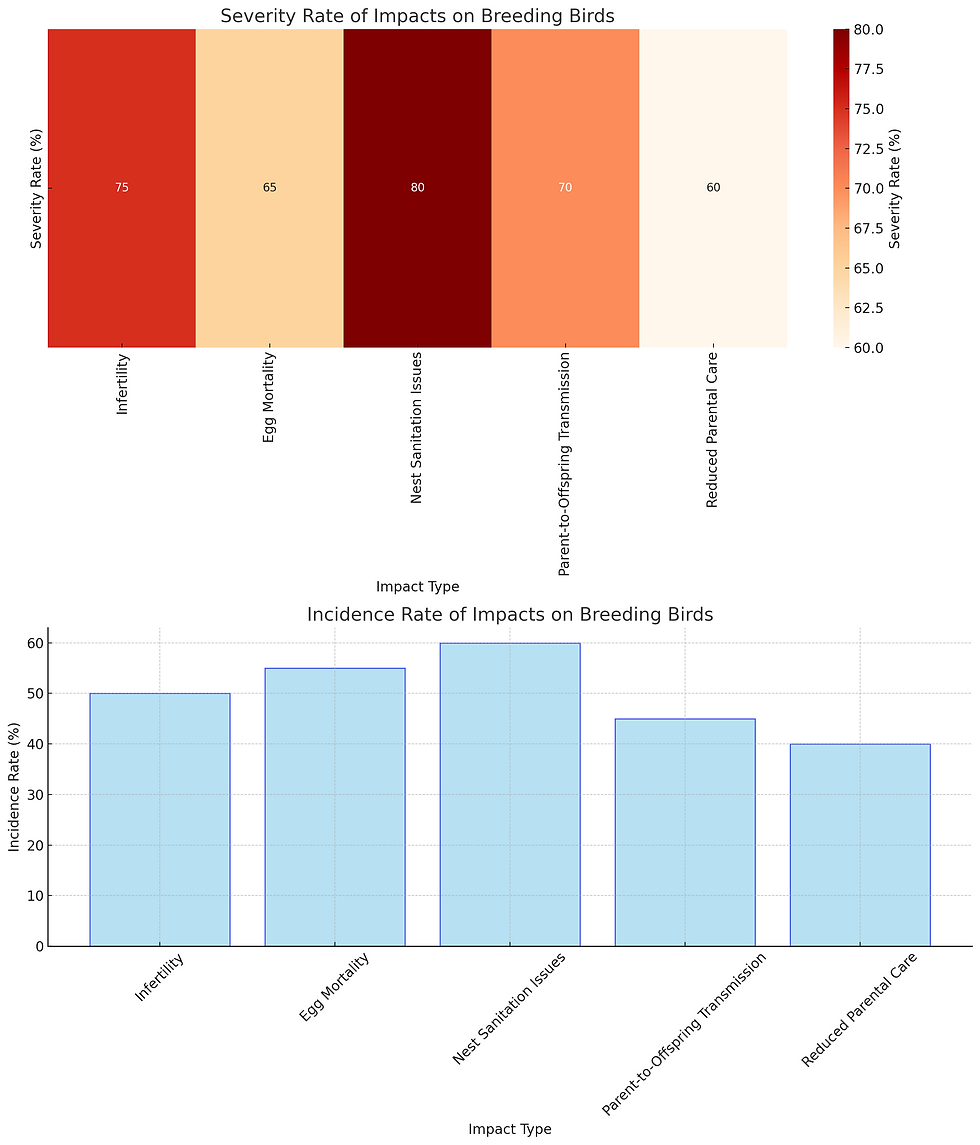
Parasites can have a big impact on breeding birds. Knowing how to manage this is important.
How do parasites cause infertility issues in breeding birds?
Parasites can lead to infertility by:
Affecting reproductive organs
Causing stress
Reducing overall health
Learn more about breeding birds in our post on Breeding Basics.
What are the main causes of egg and chick mortality due to parasites?
Parasites can cause egg and chick mortality through:
Infections
Nutrient depletion
Weakening immune systems
Find out more about keeping chicks healthy in our article on Nesting Requirements.
What nest sanitation practices help prevent parasite infestations?
Nest sanitation can prevent parasite infestations. Best practices include:
Regular cleaning
Using fresh materials
Disinfecting nests
For more on keeping nests clean, check our guide on Cleaning the Cage.
How are parasites transmitted from parent birds to offspring?
Parasites can be transmitted from parents to offspring through:
Direct contact
Contaminated nesting materials
Feeding
Discover more about breeding bird care in our article on Breeding Pairs.
What impact do parasites have on parental care in birds?
Parasites can reduce parental care by:
Causing fatigue
Reducing energy levels
Increasing stress
Learn more about the benefits of good bird care in our post on Benefits of Pet Birds.
What special considerations should be taken during the breeding season?
During the breeding season, take special considerations to protect birds from parasites by:
Enhanced health checks
Providing nutritious food
Ensuring a clean environment
Find out more about caring for breeding birds in our article on Breeding Basics.
11. Role of Environment in Parasite Control

Creating a healthy environment is key to controlling parasites in birds. Here are some tips.
How can habitat modification reduce parasite risks?
Modifying the habitat can reduce parasite risks. Consider:
Cage modifications
Outdoor environments
Habitat cleanliness
Learn more about setting up the perfect habitat in our article on Cage Size Guidelines.
What nesting materials are safe and effective in preventing parasites?
Choosing safe nesting materials helps prevent parasites. Use:
Treated materials
Natural options
Synthetic materials
Find out more about nesting needs in our post on Nesting Requirements.
How can wild bird exposure be controlled to prevent parasites?
Controlling wild bird exposure reduces parasite risks. Steps include:
Bird-proofing
Habitat isolation
Wild bird deterrents
Learn more about keeping your bird safe in our guide on Handling and Bonding.
What role do ventilation and humidity control play in parasite management?
Good ventilation and humidity control are vital for managing parasites. Ensure:
Airflow control
Humidity regulation
Environmental adjustments
Find out more about setting up a healthy environment in our post on Choosing a Cage.
How does light affect the control of bird parasites?
Light plays a role in controlling parasites. Use:
Natural light
Artificial lighting
Light cycles
Learn more about maintaining a healthy habitat in our guide on Cage Size Guidelines.
How can environmental enrichment help in parasite control?
Environmental enrichment supports parasite control. Benefits include:
Enrichment activities
Habitat enhancements
Behavioral stimulation
Discover ways to enrich your bird's environment in our post on DIY Bird Toys.
12. Research and Advances in Parasite Control

Staying updated with the latest research and advances helps in effective parasite control.
What are the latest research findings in avian parasitology?
The latest research findings provide new insights into avian parasitology. These include:
New treatment methods
Innovative preventive measures
Breakthrough discoveries
Learn more about bird health research in our article on Common Bird Diseases.
What advances have been made in treatment methods for bird parasites?
Recent advances in treatment methods for bird parasites include:
New medications
Improved application techniques
Targeted therapies
Find out more about effective treatments in our post on Common Bird Diseases.
What new preventive measures are being developed for bird parasites?
New preventive measures for bird parasites focus on:
Early detection
Innovative strategies
Holistic approaches
Learn about the importance of preventive care in our article on Balanced Diet for Birds.
How are innovations in parasite detection improving bird health?
Innovations in parasite detection improve bird health by:
Early diagnosis
Accurate identification
Effective treatments
Find out more about common bird diseases and their diagnosis in our post on Common Bird Diseases.
What trends are emerging in the study of bird parasites?
New trends in the study of bird parasites include:
Focus on environmental factors
Emphasis on preventive care
Integration of technology
Stay updated with the latest research in our article on Common Bird Diseases.
What future directions are being explored in avian parasitology research?
Future directions in avian parasitology research include:
New treatment discoveries
Preventive innovations
Enhanced diagnostic tools
Find out more about future research in bird health in our post on Common Bird Diseases.
Conclusion
Keeping our birds healthy and happy is our main goal. Parasites can make birds sick, but with the right knowledge and care, we can keep them safe.
We have learned about the different types of parasites that can affect birds. We also know how to identify them and what preventive measures to take. Using natural treatments and medications can help in getting rid of parasites.
Here are the key points to remember:
Regular health checks for birds
Keeping the environment clean
Using preventive medications
Providing good nutrition
By following these steps, we can ensure our birds live a parasite-free life. Let's take action and make sure our feathered friends stay healthy and happy!



Comments